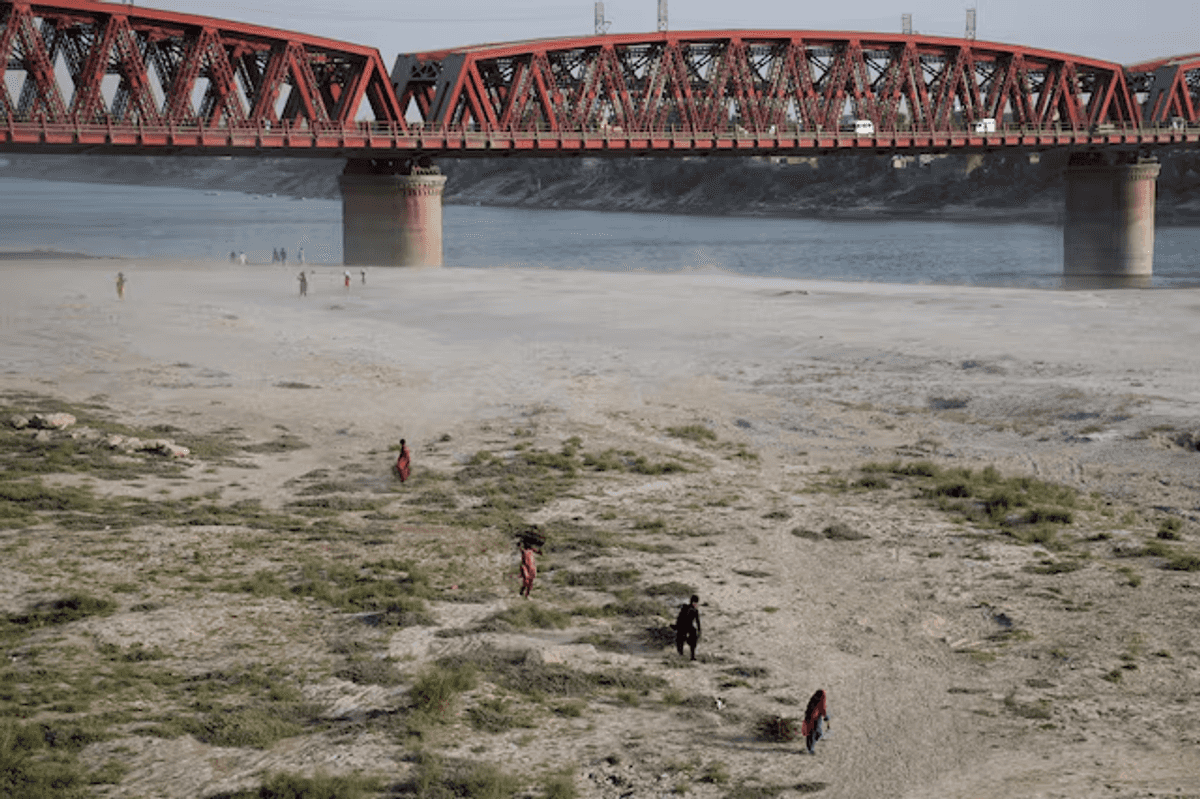Pakistan prepares to challenge India's suspension of water treaty at international forums
Islamabad warns India’s move to suspend Indus Water Treaty could escalate tensions and affect millions

Aamir Abbasi
Editor, Islamabad
Aamir; a journalist with 15 years of experience, working in Newspaper, TV and Digital Media. Worked in Field, covered Big Legal Constitutional and Political Events in Pakistan since 2009 with Pakistan’s Top Media Organizations. Graduate of Quaid I Azam University Islamabad.

People walk on the dry riverbed of the Indus River in Hyderabad, Pakistan April 24, 2025.
Reuters
Pakistan is preparing to take legal action against India in international forums over New Delhi’s suspension of a decades-old water-sharing pact following a deadly militant attack in Indian-administered Kashmir last week.
Attorney General of Pakistan Mansoor Usman Awan and Minister of State for Law and Justice Aqeel Malik confirmed that Islamabad is exploring multiple avenues, including the International Court of Justice (ICJ), the United Nations Security Council (UNSC), the Permanent Court of Arbitration, and the World Bank — which facilitated Indus Waters Treaty in 1960.
“Legal strategy consultations are almost complete,” Malik told Reuters on Tuesday. “The decision on which cases to pursue will be made soon and will likely include more than one avenue.”
India suspended the treaty last week, citing security concerns following the attack that killed 26 tourists. New Delhi claims the attackers had links to Pakistan and said the suspension would remain in place until Islamabad “credibly and irrevocably abjures its support for cross-border terrorism.”
Islamabad has rejected the allegations and condemned India’s move as a violation of international law.
During a Supreme Court hearing in Islamabad on Monday, the attorney general informed justices that a planned trip to The Hague to initiate ICJ proceedings had been postponed for further consultations. He added that the matter had received significant international attention.
Legal experts in Pakistan argue that India’s action lacks legal foundation. Former Attorney General Ashtar Ausaf said the treaty cannot be unilaterally suspended, noting that both India and Pakistan must agree to any modifications.
“This is pure political posturing,” Ausaf said, referencing the FIR filed after the Kashmir attack. He described the FIR as vague and hastily prepared — registered within 10 minutes — and suggested it resembled a “false flag operation.”
The Indus Waters Treaty, brokered by the World Bank and signed in 1960, allocates water from six rivers in the Indus Basin between the two countries. It has remained in effect despite wars and persistent hostilities.
International law expert Ahmer Bilal Soofi told Nukta that India’s suspension could undermine regional peace. While supporting a move to the ICJ, he emphasized the UNSC might offer broader leverage in addressing the treaty’s potential collapse.
“The UNSC could more effectively address the broader implications,” Soofi said, adding that Pakistan has expressed willingness to cooperate with any impartial investigation into India’s terrorism allegations.
Malik reiterated that all diplomatic options are on the table and said the treaty itself contains no provision allowing for unilateral suspension.
India has yet to formally respond to Pakistan’s legal warnings. However, Kushvinder Vohra, a former head of India’s Central Water Commission, told Reuters that India believes it has a defensible case.
“There are solid grounds for us to defend our action,” he said.
Still, experts on both sides acknowledge that India cannot immediately cut off Pakistan’s water. The treaty allows India limited use of the eastern rivers and prohibits major storage on rivers flowing to Pakistan. Any disruption would likely take months and could exacerbate water shortages already intensified by climate change.
Pakistan, which relies on the Indus basin for 80% of its irrigated agriculture and much of its hydropower, has warned that any attempt to divert water would be treated as “an act of war.”
The crisis has further strained relations between the neighbors, who have fought three wars since partition in 1947 — two of them over the disputed Kashmir region.
Pakistan has since suspended all trade with India and closed its airspace to Indian airlines.
—With additional input from Reuters.







Comments
See what people are discussing